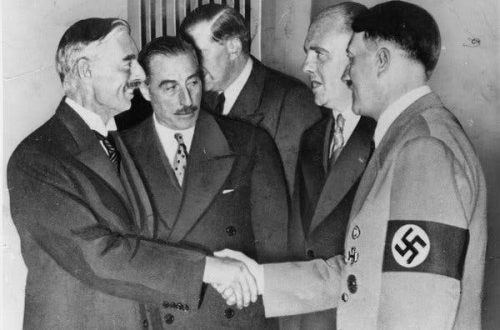

Grizzly old troublemaker and part-time blogger Norman Mailer is up to his old provocations again.
His new novel “The Castle in the Forest,” has a “disciple of the devil” enticing a top novelist into explaining Adolf Hitler’s early years (should we say his formation as a “human being?”) I’m not at all sure.
Concentrating on the young Hitler and his father Alois Schickelgruber, Mailer (at least on one level) seems to have produced a work of metafiction : wherein the disciple, who is also the narrator (which allows him to enter into many minds) , shows how Hitler grew up to become the embodiment of evil. Along the way the author gives some insights into the novelist’s craft itself.
I have not read the book yet (and after the experience of “Ancient evenings” I may never actually get round to it,) but if your interest is awakened, there is one of the Guardian’s “digested reads” here.
So what is the problem? (If you think there isn’t a problem then allow me to usher you gently to the next thread.) Mailer is a novelist, and has produced a work of fiction. It seems on the surface unlikely that anyone would take it as “history” except those determined to misread it as such (although given how the BBC’s 9/11: The Conspiracy Files, exposed how both the memo from Israel about the number of Israelis working in NY on September 11th ,and also how the TV film “The Lone Gunman” were picked up on, distorted and sold as predictive “fact,” the particular constituency which might swallow Mailer’s characterisation of Hitler whole is perhaps not especially small.
The main problem as I see it is that Mailer is shading fiction into biography (which is not as big a deal as David Irving’s desire to turn biography into history) but which may become a considerable problem if, as Mailer reportedly plans to do, the series is continued, taking Hitler on into manhood.
A biographer typically keeps the events and story of their subject intact whilst taking all sorts of liberties with the character of their subject (such as – and by no means limited to- putting thoughts into their head.) The very nature of biography demands that the reader will be placed into an interpretative position, but the reader is often unaware of this fact. Put simply, our Norm wants to “trick” you into feeling some sort of sympathy for the young and abused Adolf, so that he can then point to a complicity in his crimes; much like (in the words of Sting) “the old man in that famous book by Nabakov” has us unwillingly beginning to sympathise with a paedophile.
As provocative as this sounds, Mailer says he is not being facetious, that he wants to answer a question here – what was the genesis of Hitler’s evil? “Look, we can understand Joseph Stalin in a way,” he says. “One of the things about Stalin is that he was one of the very toughest men in Russia. Hitler was not that tough. It was as if odd gifts were given to him at extraordinary moments.” Mailer says such gifts can only have come from the Devil, who Mailer believes works all the time.
It is true that the closer a historian gets to the personality of Hitler the more (unless one puts up a conscious barrier) one can begin to sympathise with him as a person. Don’t take this the wrong way, but it is not always easy to stop history becoming “fiction” as you read it. The same is not true of Joseph Stalin, when you read about the few human features of the Georgian dictator -trips to the Kremlin’s cinema with his daughter, and talks with the Patriach about his early religious experiences for instance, one is always aware of the absolute darkness and horror and grip of steel which “Koba” is subjecting his country to at the time. Anecdotes about Hitler on the other hand, such as when a British ambassador arrives whilst Hitler is in too good a humour and the Fuhrer turns to Ribbentrop saying “don’t let him in yet” and then proceeds to puff himself up into a theatrical rage in order to greet his guest, only serve to make the German dictator a more Chaplinesque figure; somehow more comic and more human. We are of course in a dangerous position when we begin to sympathise with Hitler, even on the level of comedy. Like the reader of Mailer’s book we know what his legacy is, we know the ending. With that in mind only a lunatic could put a positive spin on the life of Hitler and such is the slippery slope which (if we need an explanation) most probably befell David Irving.
When talking about conspiracy theories in the comments boxes recently the suspension of disbelief that we all undertake in order to enjoy movies and other entertainment was mentioned. The problem with Mailer’s “Adolf Junior” is that we may well be living in an age where many people have actually lost the ability to distinguish reality from fantasy. When everything is interpreted as part of a “conspiracy,” the idea that someone is in control, (even if they are the evil “Bushitler”) is actually a lot more comforting than accepting that we are staring into a void where some things happen without reason, cannot be explained , or are beyond anyone’s capacity to control. I know, I know. Hyperreality is one of those nasty post-modern theories, but it seems to me anyway to explain a particular state of being which is encountered more and more often these days.
We could make a simple linear thread going through the Henry Sidgewick’s of the late 19th century who (according to Keynes) “Never did anything but wonder whether Christianity was true, and prove that it wasn’t, and hope that it was” through the British “Cambridge Communists” of the 1930’s who held onto Marxism because they had been brought up to believe in something (anything?) and who to various degrees, supported Stalinism and hung onto Marxist interpretations of history long after they had been proven false, and finally on into a world where Chomsky’s excuses for the failure of Marxism (hat tip Nick Cohen.) have led large sections of an affluent western youth who consider themselves of “the left” (without any real basis for thinking themselves so other than it is “the thing to be”) to believe in anything rather than face up to living with an uncertainty which is routinely parodied as “postmodernism” but which is in fact the postmodern condition. Rationality tells us that life is uncertain, our need to believe it isn’t leads us to tell ourselves comforting stories which may have little relation to reality….
Forget the “Free Speech” argument – I don’t want to ban fiction. The point I suppose is this: what kind of Hitler do we want in the 21st century? We can’t paper over him, we don’t want to “forget” him. Do we really want a Hitler who is “human” and “understood” or are such people best left as monsters? Should novelists and others play with our perceptions of how people like Hitler thought? The French historian Marc Ferro once remarked that the idea that most people have of history is derived from two major sources: the mouldering relics of their primary school history lessons, and the cinema.
So how do we stop works of fiction being taken for works of history? Particularly in a climate where conspiracy theories seem so seductively attractive?


